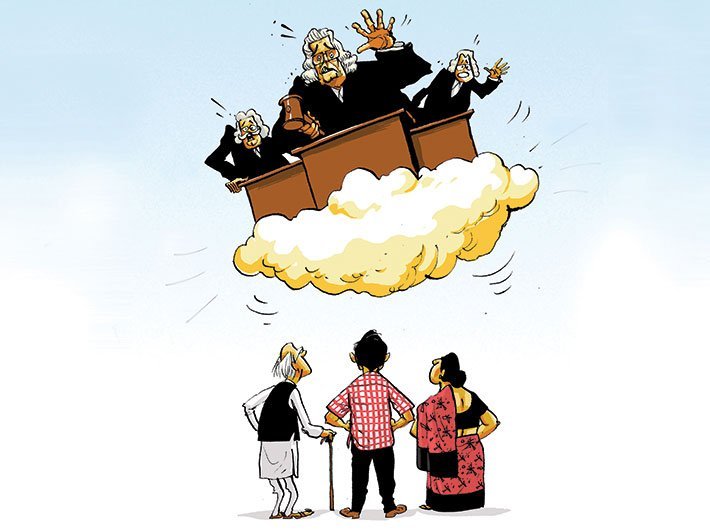The verdict has been termed as a collective order of the highest court of the land and it brings judiciary in direct conflict with the legislature, which claims to represent the will of the people of India. In a ‘collective order’ today, the supreme court struck down on the national judicial appointments commission (NJAC) law meant to replace the two-decade old collegium system of judges appointing judges in higher judiciary.
The court held that the collegium system as it existed before the NJAC 'operative' even though during the course of arguments in the case, attorney general Mukul Rohtagi had declared that the collegiums ‘was dead’.
Read more: Revamping justice: My Lord, heavens have fallen!
A Bench of five judges of the SC held the 99th Constitutional Amendment Act and the NJAC Act 2014 "unconstitutional and void". The verdict quashing the NJAC Act was delivered by a five-judge constitution bench comprising justices J S Khehar, J Chelameswar M B Lokur, Kurian Joseph and A K Goel which also rejected the plea of Central government to refer for review to larger bench the 1993 and 1998 verdict of the apex court on the appointment of judges to the higher judiciary.
While four judges held as unconstitutional the 99th amendment of the Constitution, justice J Chelameswar differed with them and gave his own reasons for upholding its validity. Justice Chelameswar said he has "upheld" the constitutionality of the 99th Constitutional Amendment Act but recused himself from passing any judgment on the NJAC statute as the majority of four had already held it unconstitutional.
Read more: Bridging trust deficit in judicial appointments
Justice Khehar, who pronounced the judgment for the bench, said that the system of appointment of judges to the Supreme Court and the Chief Justice and judges of the high courts and transfer of judges from one high court to another has been existing in the Constitution prior to the 99th amendment.
"Help us decide for a better system of judicial appointments," justice Khehar told the Centre and the petitioners. The Bench said that the judgment was the "collective view of the court".
The bench listed the petitions on November 3 to invite suggestions to improve the working of the existing collegium system. Justice Khehar said each one of us have recorded their reasons and order has been jointly signed.
The Bench struck down on the government's arguments that the question of validity of the NJAC and the 99th Constitutional Amendment should be referred to a larger Bench in light of the two 'Judges Cases' of 1993 and 1998.
The NJAC Act was meant to replace the two-decade old collegium system of judges appointing judges in higher judiciary. The SC rejected the plea of Centre that the petition challenging NJAC Act be referred to a larger Bench.
The NJAC was a body created to end the two-decade-old collegium system of judges appointing judges to the highest courts in the land.
The parliament had unanimously voted in favour of the NJAC law and the Constitutional Amendment. The latter was then ratified by 20 State Assemblies and had received the Presidential assent.
Noted jurists like Fali Nariman, Anil Divan and Ram Jethmalani were among prominent senior advocates who had argued against the NJAC replacing the collegium system.


